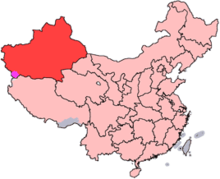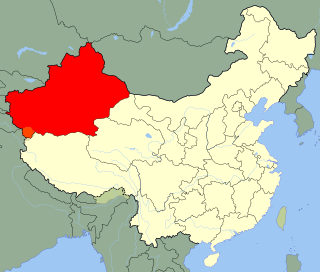
East Turkestan, also East Turkistan, varies in meaning by context and usage. The term was coined in the 19th century by Russian Turkologists including Nikita Bichurin to replace another Western term, Chinese Turkestan, which referred to the Tarim Basin in the southwestern part of Xinjiang during the Qing Dynasty. The medieval Persian toponym "Turkestan" and its derivatives were not, however, used by the local population. The Uyghur name for the Tarim Basin is Altishahr, which means "Six Cities" in Uyghur. Besides, China had since the Han Dynasty had its own name for an overlapping area: the "Western Regions." The parts of this area controlled by China were termed "Xinjiang" starting in the 18th century.
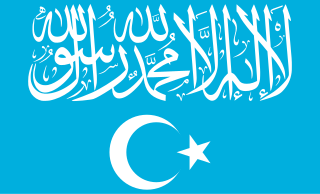
The Turkistan Islamic Party (TIP) or Turkistan Islamic Movement (TIM), formerly known as the East Turkestan Islamic Movement (ETIM) and other names, is an Islamic extremist organization founded by Uyghur jihadists in Western China, considered broadly as a terrorist group. Its stated goals are to establish an independent state called East Turkestan replacing Xinjiang. According to a Chinese report, published in 2002, between 1990 and 2001 the ETIM had committed over 200 acts of terrorism, resulting in at least 162 deaths and over 440 injuries. The UN Security Council Al-Qaida Sanctions Committee has listed ETIM as a terrorist organization since 2002.

The East Turkestan independence movement, also known as the Xinjiang independence movement or the Uyghur independence movement, is a political movement that seeks independence for Xinjiang Uyghur Autonomous Region, a large and sparsely-populated province-level subdivision of the People's Republic of China (PRC/China) located in the country's northwest, as a homeland for the Uyghur people, who are primarily of Turkic rather than Sinitic ethnic extraction. Within the movement, there is widespread support for the region to be renamed, since "Xinjiang" is seen by independence activists as a colonial name. "East Turkestan" is the most well-known proposed name. "Uyghurstan" is another well-known proposed name.

The East Turkestan Liberation Organization (ETLO) was a secessionist Uyghur organization that advocated for an independent Uyghur state named East Turkestan in the Western Chinese province known as Xinjiang. The organization was established in Turkey in 1990 or 1996 to fight against the Chinese government in Xinjiang, a territory in which no ethnicity forms a majority, but is inhabited in order of most populous to least by Uyghur, Han Chinese, Kazakh and other Turkic communities. ETLO is a designated terrorist organization by the governments of China, Kazakhstan, and Kyrgyzstan.
The Three Evils is a political slogan of the People's Republic of China defined as terrorism, separatism and religious extremism. The phrase refers to declared counter-terrorism operations undertaken by China, Central Asian republics, and Russia, primarily as related to Xinjiang. The Chinese government views each of the Three Evils as interrelated phenomena driving persistent instability in the westernmost province of Xinjiang, and the slogan has been deployed extensively in support of Xinjiang re-education camps since 2017.
Hasan Mahsum, also known as Abu-Muhammad al-Turkestani and Ashan Sumut, was the leader of the Islamic extremist group East Turkestan Islamic Party and suspected of having ties with Al Qaeda. He was shot dead in a counter-terrorism operation on October 2, 2003 by the Pakistani Army.
Terrorism in China refers to the use or threatened use of violence to affect political or ideological change in the People's Republic of China. The definition of terrorism differs among scholars, between international and national bodies and across time and there is no legally binding definition internationally. In the cultural setting of China, the term is relatively new and ambiguous.
Terrorism in Tajikistan stems largely from the forces of political opposition who opposed the comprehensive peace agreement that ended the civil war in 1997. President Emomali Rahmonov and UTO leader Said Abdullah Nuri signed the agreement on 27 June, believing it would bring an end to hostilities. However, dissident Islamist militants led by Tohir Yo‘ldosh and Juma Namangani formed the Islamic Movement of Uzbekistan in 1998, allying with Al-Qaeda and vowing to unite Central Asia as an Islamic state. The latest terror attacks took place in the Qabodiyon District on November 6, 2019 when a policeman and a border guard were killed by several Islamic State militants. 15 terroristi were also killed.

The 2008 Uyghur unrest is a loose name for incidents of communal violence by Uyghur people in Hotan and Qaraqash county of Western China, with incidents in March, April, and August 2008. The protests were spurred by the death in police custody of Mutallip Hajim.

The 2008 Kashgar attack occurred on the morning of 4 August 2008 in the city of Kashgar in the Western Chinese province of Xinjiang. According to Chinese government sources, it was a terrorist attack perpetrated by two men with suspected ties to the Uyghur separatist movement. The men reportedly drove a truck into a group of approximately 70 jogging police officers, and proceeded to attack them with grenades and machetes, resulting in the death of sixteen officers. Foreign tourists who witnessed the scene provided a divergent account of events, saying that the attackers appeared to be machete-wielding paramilitary officers.

The World Uyghur Congress is an international organization of exiled Uyghur groups that aspires to "represent the collective interest of the Uyghur people" both inside and outside of the Xinjiang Uyghur Autonomous Region of the People's Republic of China. The World Uyghur Congress describes itself as a nonviolent and peaceful movement that opposes what it considers to be the Chinese occupation of East Turkestan and advocates rejection of totalitarianism, religious intolerance and terrorism as an instrument of policy. The Congress is funded in part by the National Endowment for Democracy or NED of the United States.
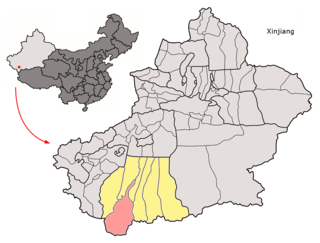
The 2011 Hotan attack was a bomb-and-knife attack that occurred in Hotan, Xinjiang, China on July 18, 2011. According to witnesses, the assailants were a group of 18 young Uyghur men who opposed the local government's campaign against the burqa, which had grown popular among older Hotan women in 2009 but were also used in a series of violent crimes. The men occupied a police station on Nuerbage Street at noon, killing two security guards with knives and bombs and taking eight hostages. The attackers then yelled religious slogans, including ones associated with Jihadism, as they replaced the Chinese flag on top of a police station with another flag, the identity of which is disputed.

The 2011 Kashgar attacks were a series of knife and bomb attacks in Kashgar, Xinjiang, China on July 30 and 31, 2011. On July 30, two Uyghur men hijacked a truck, killed its driver, and drove into a crowd of pedestrians. They got out of the truck and stabbed six people to death and injured 27 others. One of the attackers was killed by the crowd; the other was brought into custody. On July 31, a chain of two explosions started a fire at a downtown restaurant. A group of armed Uyghur men killed two people inside of the restaurant and four people outside, injuring 15 other people. Police shot five suspects dead, detained four, and killed two others who initially escaped arrest.
The 2012 Yecheng attack occurred on February 28, 2012 in Yecheng, Xinjiang, a remote town on China's border with Pakistan. Details of the attack are disputed: according to Chinese government reports and court documents, at around 6 p.m. that day, a group of eight Uyghur men led by religious extremist Abudukeremu Mamuti attacked pedestrians with axes and knives on Happiness Road. Local police fought with the attackers, ultimately killing all and capturing Mamuti. State-run media reported that one police officer died and four police were injured, while 15 pedestrians died from Mamuti's assault and 14 more civilians were injured. Chinese officials characterized the event as a "terrorist attack."
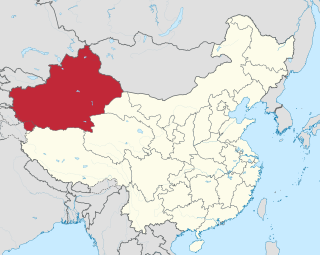
The Xinjiang conflict, also known as Uyghur–Chinese conflict, is a conflict in China's far-northwest autonomous region of Xinjiang centred on the Uyghurs, a Turkic minority ethnic group who make up the largest group in the region.
On 26 June 2013, 35 people died in the riots, including 22 civilians, two police officers and eleven attackers.
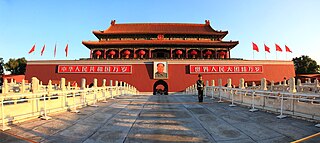
On 28 October 2013, a car crashed in Tiananmen Square, Beijing, China, in a terrorist suicide attack. Five people died in the incident; three inside the vehicle and two others nearby. Police identified the driver as Usmen Hasan and the two passengers as his wife, Gulkiz Gini, and his mother, Kuwanhan Reyim. An additional 38 people were injured.
On the early morning of Wednesday, 30 July 2014, Juma Tahir, the imam of China's largest mosque, the Id Kah Mosque in northwestern Kashgar, was stabbed to death by three young male Uyghur extremists.

The Xinjiang re-education camps, officially called Vocational Education and Training Centers by the Government of China, are internment camps operated by the Xinjiang Uygur Autonomous Region government and its CCP committee. Human Rights Watch claims that they have been used to indoctrinate Uyghurs and other Muslims since 2017 as part of a "people's war on terror," a policy announced in 2014. The camps have been criticized by many countries and human rights organizations for alleged human rights abuses and mistreatment, with some even alleging genocide.
Critics of China's treatment of Uyghurs have accused the Chinese government of propagating a policy of sinicization in Xinjiang in the 21st century, calling this policy an ethnocide or a cultural genocide of Uyghurs, with some activists and human rights experts calling it a genocide.
